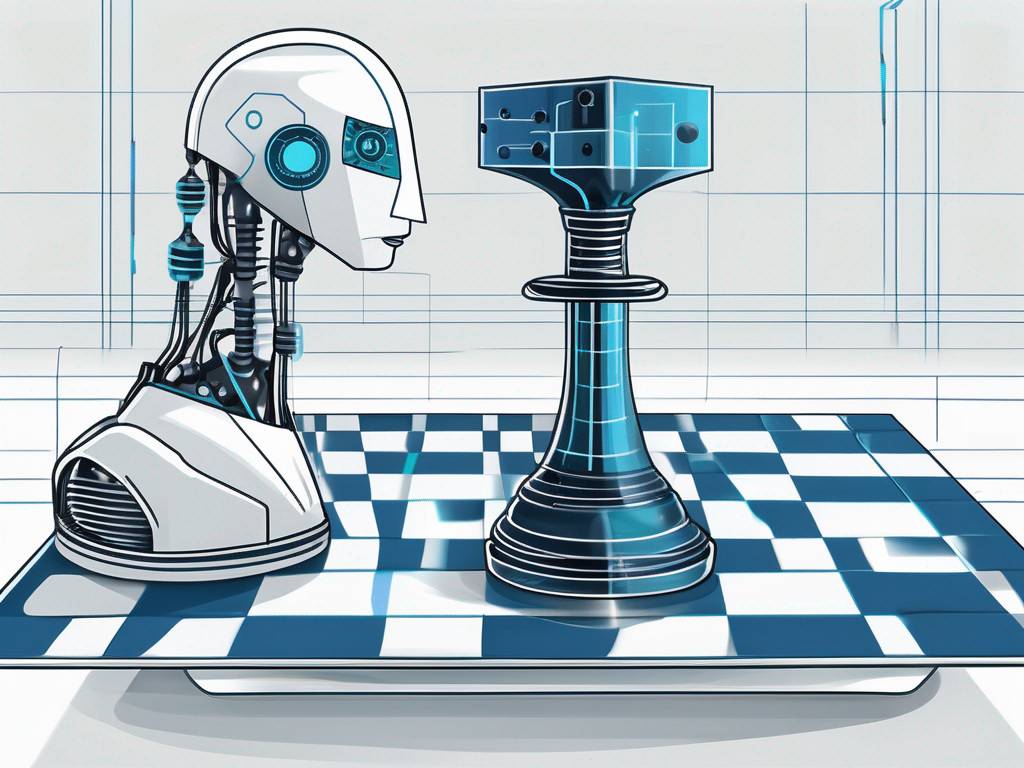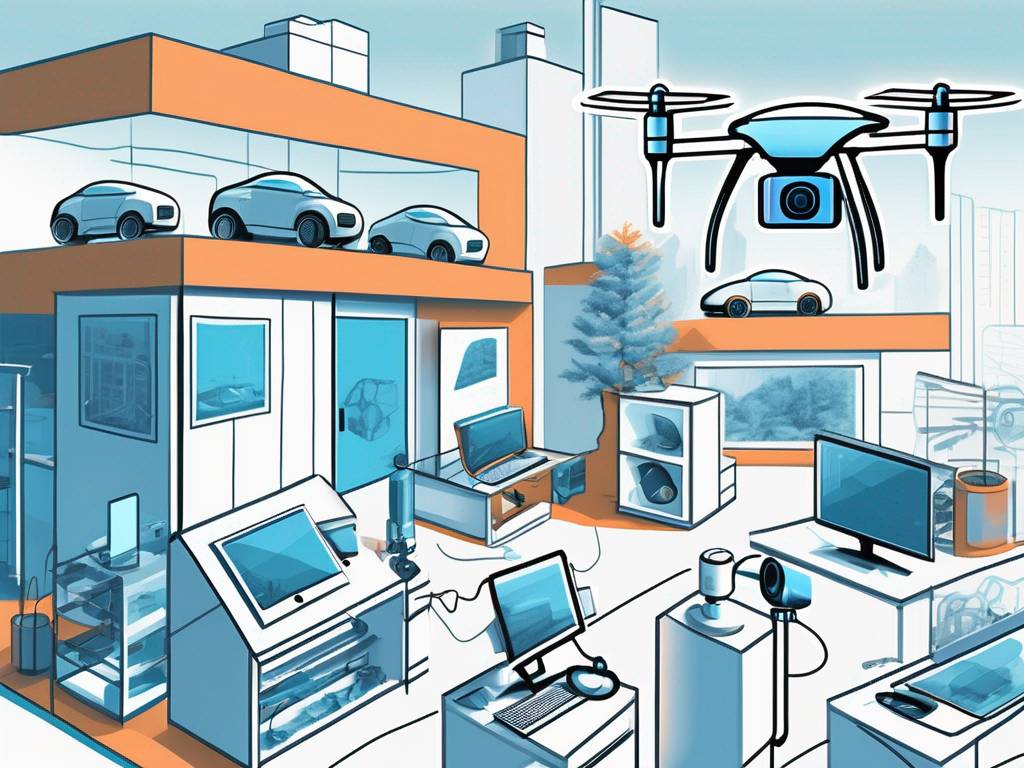The Impact of AI in the Hospitality Industry
Key Insights
- AI has become increasingly relevant in the hospitality industry, revolutionizing various aspects of customer service, operational efficiency, and personalizing the guest experience
- AI technologies such as chatbots and machine learning algorithms are being employed to improve hotel bookings, customer interaction, inventory management, energy management, food and beverage recommendations, and room customization
- The future of AI in the hospitality industry is promising, but also poses challenges that need to be addressed for successful implementation
- C-level executives in the hospitality industry need to embrace AI technologies to stay competitive, enhance customer experience, and drive operational efficiency
Understanding AI & Its Relevance to the Hospitality Industry
In recent years, the hospitality industry has witnessed the rapid rise of Artificial Intelligence (AI) and its significant impact on various aspects of operations. AI has revolutionized how hotels and resorts deliver customer service, enhance operational efficiency, and personalize the guest experience. This article explores the intersection of AI and the hospitality industry, delving into how AI is reshaping the landscape and what it means for executives in the industry.
Defining Artificial Intelligence
Artificial Intelligence can be defined as the simulation of human intelligence in machines that are programmed to think and learn like humans. In the context of the hospitality industry, AI technologies encompass a wide range of applications, including machine learning, natural language processing, and computer vision. These technologies enable hotels and resorts to automate mundane tasks, gain insights from data, and deliver personalized experiences to guests.
Machine learning, a subset of AI, allows computers to learn and improve from experience without being explicitly programmed. In the hospitality industry, machine learning algorithms can analyze vast amounts of data, such as customer preferences, booking patterns, and guest feedback, to identify trends and make predictions. This valuable information can then be used to tailor services and offerings to individual guests, creating a more personalized and memorable experience.
Natural Language Processing (NLP) is another AI technology that has found its way into the hospitality industry. NLP enables computers to understand and interpret human language, both written and spoken. This capability has transformed customer service, as chatbots and virtual assistants can now interact with guests, answer their questions, and provide recommendations in a natural and efficient manner. By leveraging NLP, hotels and resorts can enhance their customer service capabilities, ensuring that guests receive prompt and accurate assistance at any time.
Computer vision, another branch of AI, enables machines to analyze and understand visual data. In the hospitality industry, computer vision can be used for various purposes, such as facial recognition technology for check-ins, monitoring guest behavior to improve security, or even analyzing guest expressions to gauge satisfaction levels. By harnessing the power of computer vision, hotels and resorts can automate processes, enhance security measures, and gain valuable insights into guest preferences and behavior.
The Intersection of AI & Hospitality
The marriage between AI and the hospitality industry has been transformative. From automated check-ins to personalized room recommendations, AI-powered tools have paved the way for a more efficient and personalized guest experiences. C-level executives in the hospitality industry must understand the potential of AI and leverage it to stay ahead in this highly competitive market.
One area where AI has made a significant impact is revenue management. By analyzing historical data, market trends, and competitor pricing, AI-powered revenue management systems can optimize room rates in real-time, maximizing revenue and occupancy. These systems take into account various factors, such as demand, seasonality, and even weather conditions, to dynamically adjust prices and availability. This level of precision and automation allows hotels to optimize revenue without manual intervention, freeing up staff to focus on other critical tasks.
AI hospitality have also revolutionized the guest experience. Through the use of AI-powered chatbots and virtual assistants, hotels can provide instant and personalized assistance to guests, enhancing their overall satisfaction. Chatbots can handle routine inquiries, such as room service requests or restaurant recommendations, freeing up staff to handle more complex guest needs. AI virtual assistants, on the other hand, can provide personalized recommendations based on guest preferences, such as suggesting nearby attractions or arranging transportation. By leveraging AI, hotels can create a seamless and personalized guest journey, from booking to check-out.
AI has also improved operational efficiency in the hospitality industry. By automating repetitive and time-consuming tasks, such as data entry or inventory management, hotels can reduce human error and allocate resources more effectively. For example, AI-powered systems can automatically track and manage inventory levels, ensuring that housekeeping supplies are replenished at the right time. This automation not only saves time but also reduces costs and improves overall operational efficiency.
Another area where AI has had a significant impact is in the field of marketing and customer engagement. AI-powered analytics tools can analyze vast amounts of customer data, such as social media interactions, online reviews, and booking patterns, to identify trends and preferences. This information can then be used to create targeted marketing campaigns, personalized offers, and loyalty programs. By leveraging AI in marketing efforts, hotels can better understand their customers, deliver relevant and timely promotions, and ultimately drive customer loyalty and satisfaction.
AI has become an integral part of the hospitality industry, transforming how resorts and hotel operations serve guests. From personalized experiences to operational efficiency, AI technologies have revolutionized various aspects of the industry. By leveraging AI, hotels can enhance customer service, optimize operations, and ultimately deliver exceptional guest experiences.
The Role of AI in Enhancing Customer Service
Customer service has always been a crucial aspect of the hospitality industry, and AI has brought about significant improvements in this domain. AI-powered solutions have revolutionized hotel bookings and reservations, making the process seamless and efficient. With AI algorithms analyzing data and customer preferences, hotels can provide personalized recommendations and ensure a smooth booking experience.
AI in Hotel Bookings & Reservations
AI has significantly enhanced the hotel booking experience by making it more efficient, personalized, and user-friendly. Through sophisticated machine learning algorithms, AI analyzes vast amounts of data, including past booking behaviors, preferences, and market trends, to offer customers tailored recommendations. This personalized approach ensures that customers are presented with hotel options that closely match their preferences and needs, making the decision process quicker and more satisfying.
AI Chatbots for Customer Interaction
AI chatbots have become a cornerstone of customer interaction in the hospitality industry. These AI-powered virtual assistants are designed to handle a vast range of customer queries and provide real-time assistance. AI chatbots utilize natural language processing to understand and respond to guest inquiries promptly. They can provide information about hotel amenities, local attractions, and even assist in making reservations. C-level executives must recognize the potential of AI chatbots in augmenting customer service and improving operational efficiency.
AI in Operational Efficiency & Cost Reduction
In addition to enhancing customer service, AI has also played a vital role in improving operational efficiency and reducing costs for hotels and resorts. AI technologies have revolutionized inventory management and energy management, leading to significant savings and streamlined operations.
AI in Inventory Management
Managing inventory is a critical aspect of hospitality businesses, and AI has made this task more efficient and accurate. AI algorithms can analyze historical data, seasonal trends, and customer preferences to optimize inventory levels. By accurately forecasting demand and automating inventory tracking, hotels can minimize waste, reduce costs, and ensure optimal resource allocation.
AI in Energy Management
Energy costs constitute a significant expense for hotels and resorts. AI technologies have enabled efficient energy management, leading to substantial cost reductions and environmental benefits. By utilizing sensor data and machine learning algorithms, hotels can optimize energy usage, automatically adjust climate control, and identify energy-saving opportunities. These AI-powered energy management systems not only reduce operational costs but also contribute to sustainability initiatives.
AI in Personalizing Guest Experience
Personalization plays a crucial role in delivering exceptional guest experiences, and AI has empowered hotels and resorts to tailor their offerings to individual preferences. By harnessing the power of AI, hotels can provide personalized food and beverage recommendations and customize rooms to meet the specific needs of guests.
AI in Food & Beverage Recommendations
AI technologies can analyze guest preferences, dietary restrictions, and previous ordering behaviors to provide personalized food and beverage recommendations. By understanding individual tastes and preferences, hotels can create customized menus and offer tailored dining experiences. This level of personalization enhances guest satisfaction and fosters loyalty.
AI in Room Customization
Every guest has unique preferences when it comes to room amenities, ambiance, and layout. AI technologies enable hotels to customize rooms based on individual preferences, providing guests with a personalized and memorable experience. From adjusting lighting and temperature to pre-selecting preferred music or TV channels, AI-powered room customization ensures that guests feel right at home.
The Future of AI in the Hospitality Industry
The future of AI in the hospitality industry is both exciting and challenging. As technology continues to evolve, AI is expected to play an even more prominent role in delivering exceptional guest experiences and driving operational efficiency. However, there are also potential challenges that need to be addressed for successful AI implementation.
Predicted AI Trends in Hospitality
Experts predict several key AI trends that will shape the future of the hospitality industry. These include the widespread adoption of voice-enabled AI assistants, the use of AI to enhance data security, and the integration of AI with Internet of Things (IoT) technologies. Additionally, AI-powered analytics and predictive modeling will become indispensable tools for hotels to make data-driven decisions and optimize resource allocation.
Potential Challenges & Solutions for AI Implementation
Implementing AI in the hospitality industry comes with its own unique set of challenges. One of the main challenges is ensuring data privacy and security while harnessing the vast amount of guest data. C-level executives must prioritize data protection and implement robust security measures to mitigate risks. Additionally, there is a need for continuous staff training and upskilling to adapt to the changing AI landscape. By investing in employee development and fostering a culture of innovation, hotels can successfully capitalize on AI’s potential.
Conclusion
The impact of AI in travel and the hospitality industry has been profound, elevating customer service, operational efficiency, and personalization. C-level executives in the industry must embrace AI technologies to stay competitive and enhance the overall guest experience. From seamless hotel bookings and efficient inventory management to personalized recommendations and room customization, AI is reshaping the industry. As the future unfolds, embracing these advancements will be paramount to success in the ever-evolving hospitality landscape.
Questions?
- How is AI transforming the hospitality industry?Toggle questionAI is revolutionizing hospitality by enhancing guest experiences, optimizing operations, and providing data-driven insights for better decision-making.
- What are some common applications of AI in the hospitality sector?Toggle questionAI applications include personalized guest services, chatbots for customer support, demand forecasting, revenue management, and enhancing operational efficiency in hotels and resorts. These new features can exceed guest expectations and help reduce the load on hotel staff.
- Can AI improve guest experiences in hotels and restaurants?Toggle questionAbsolutely! AI enhances guest experiences by offering personalized recommendations, streamlining check-in/check-out processes, providing virtual concierge services, and ensuring efficient room management. It even provides AI powered virtual tours to allow guests to see the space before booking.
- How does AI contribute to hotel revenue management?Toggle questionAI aids in revenue management by analyzing market trends, optimizing pricing strategies, and predicting demand, helping hotels maximize profits and occupancy rates.
- Is AI used for enhancing safety and security in the hospitality industry?Toggle questionYes, AI contributes to safety and security by monitoring surveillance footage, detecting unusual patterns, and implementing access control systems, thereby enhancing overall security measures.
- Can AI assist in managing hotel operations more efficiently?Toggle questionIndeed. AI optimizes hotel operations by automating routine tasks, managing room inventories, handling guest requests, predicting maintenance needs, and improving overall efficiency in the hospitality workflow.
- Are there privacy concerns associated with AI in the hospitality sector?Toggle questionPrivacy considerations may arise, especially with guest data. Responsible AI implementation involves transparent data practices, compliance with privacy regulations, and prioritizing guest consent.
- How can AI contribute to sustainability in the hospitality industry?Toggle questionAI supports sustainability by optimizing energy usage, managing resources efficiently, and implementing eco-friendly practices in areas like waste management and energy conservation.
- What challenges might the hospitality industry face in adopting AI?Toggle questionChallenges include initial investment costs, staff training, ensuring data security, and addressing concerns related to guest privacy. Overcoming these challenges requires a strategic and well-planned implementation.
- How can small businesses in the hospitality sector benefit from AI?Toggle questionAI offers scalable solutions for small businesses by automating tasks, enhancing customer interactions, and providing cost-effective tools for managing reservations, marketing, and overall guest satisfaction.

 hello@westlink.com
hello@westlink.com  (866) 954-6533
(866) 954-6533  700 N Colorado Blvd,
700 N Colorado Blvd,







Comments